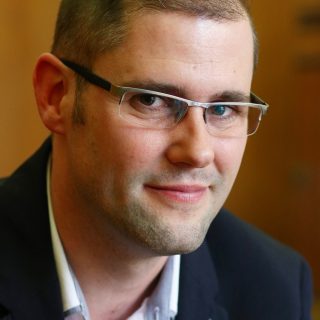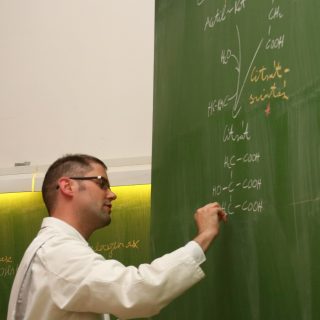Born in Szekszárd in 1986, dr. Gábor Mátis’ teaching career has been as straight as an arrow. Fuelling his imaginary spaceship with biology and chemistry, he arrived in the István Street Galaxy using a biochemical “mixture”. His research has focused on metabolic processes and in vitro experiments with cell cultures. However, his favourite time is when he stands in front of the students with a chalk in his hand. He is an associate professor of the Division of Biochemistry at the Department of Physiology and Biochemistry, and he has been working as the University’s Director for Education for a few months. Here’s an excerpt from our interview with him.
 I always wanted to be a teacher. I got engaged to biology and chemistry due to my great high school teachers. Listening to the advice of my high school teacher parents, who said that I would still have time to decide between practice or teaching, I chose the veterinary career. After graduation, there was no question that I would go for the latter. As an undergraduate, I was considered a good student, my exams usually went well. I was teaching biochemistry practicals as early as in my fifth year, both in Hungarian and English.
I always wanted to be a teacher. I got engaged to biology and chemistry due to my great high school teachers. Listening to the advice of my high school teacher parents, who said that I would still have time to decide between practice or teaching, I chose the veterinary career. After graduation, there was no question that I would go for the latter. As an undergraduate, I was considered a good student, my exams usually went well. I was teaching biochemistry practicals as early as in my fifth year, both in Hungarian and English.
What was your vision for your studies at the beginning, and was it realized over the years?
My first impression was that it was a small and familiar university. My hunch that it was a tight-knit community was confirmed as the years went by. The first Anatomy lecture, where Professor Sótonyi showed the different parts of the body on a live horse, was a great experience. On the other hand, he scared the wits out of the entire group when he said we had to learn all we heard on Monday for the practical on Thursday. The assigned “homework” and the enormous amount of Latin phrases seemed too much of a task; in fact, we didn’t really believe it was possible to learn all that. Yet it was, if you gave it your all. In the meantime, we fell in love with the subject as a foundation of our profession. It was partly due to Professor Sótonyi’s enthusiasm. His fiery and dynamic delivery of the lectures made a huge impression on the students. As a professor, I always aim to teach with great enthusiasm so that I could demonstrate the beauty of biochemistry, too.
As an instructor, you have contacts with all of the University’s students since you teach in English, Hungarian and German as well. Isn’t it exhausting to switch from one language to another?
As a matter of fact, it’s not always easy when there’s an English and a German class back to back. Ms Neogrády is in charge of the English group, I “manage” the Hungarian and the German students. I “inherited” the Hungarian lectures from Professor Veresegyházy in 2013 and I took over the German class from Professor Emeritus Ferenc Kutas in 2014. I felt it was a great opportunity to be charged with the theoretical education and examination of entire years at a relatively young age.
The language of education is not the only difference between our students. 90 per cent of the German-speaking students come from Germany. They are easy to work with because it’s a tight-knit group of diligent and hard-working people. Their basic education level is similar, too. On the other hand, the Hungarians tend to be the best students as they are not even enrolled unless they obtain two advanced A-levels in secondary school.
What traditions do you promote in the teaching of biochemistry?
I am proud to use chalk in our lectures and write down the metabolic processes together with the students, step by step. Due to the complexity of biochemical reactions, we actually need three large blackboards for that. The success of our method is clearly shown by the fact that our lecture hall is always full, even without an attendance list.
What tasks do you have as the director for education?
Our rector assigned me to help the work of the vice-rector for study affairs as well as the Students’ Secretariat. Our enrolment activities are important and quite diverse. I am actively involved in the development of the curriculum for the 12th semester in the veterinary training programme, the newly-launched livestock veterinary care programme and the restoration of the zoologist training programme.
What do you expect from the upcoming decade?
I wish for the Biochemistry Division’s familiar, tight-knit team to grow even stronger and to help our current PhD students to become full members of our department. We will continue our existing intensive research and open new paths, too. For example, we’ve already started preparing 3D cell cultures. As far as my personal goals are concerned, I would like to obtain the DSc title of the Hungarian Academy of Sciences by 2030. But the most important thing is to establish a family, get married and have children!
Interview by Gusztáv, Balázs – UNIVET Magazine, 2020 March
